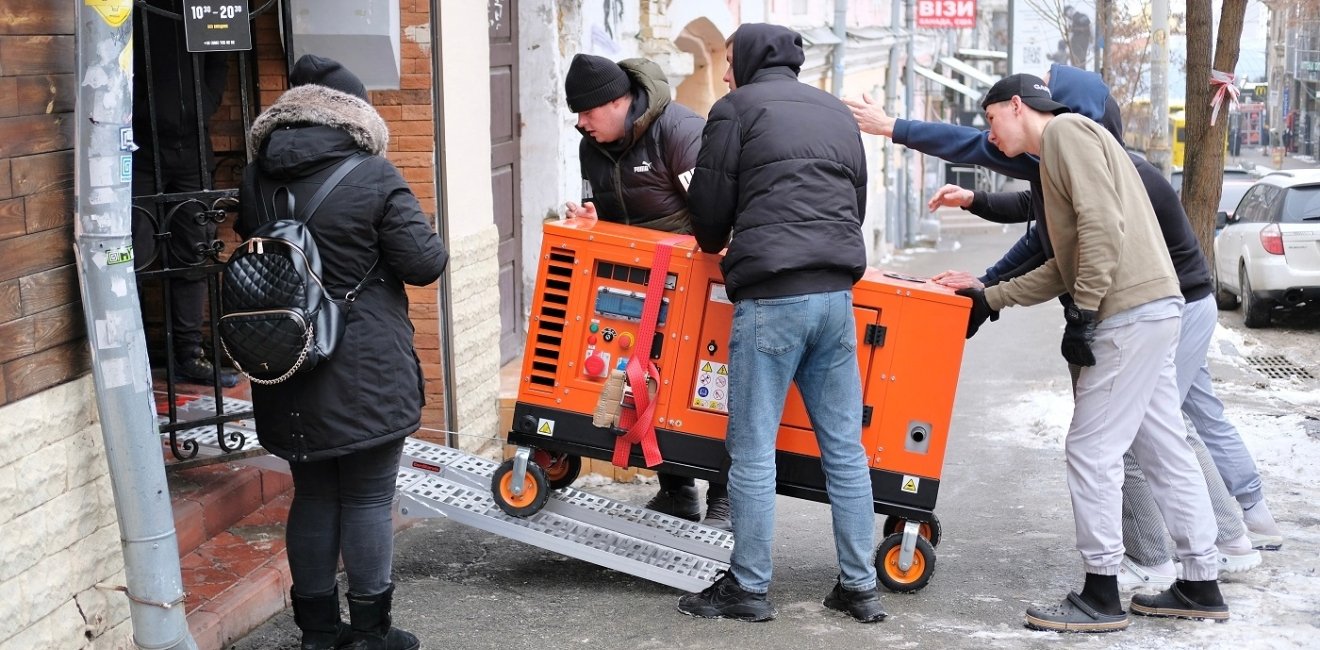
A blog of the Kennan Institute
The people of Ukraine have had to adjust to attacks on the telecommunications and electricity infrastructure almost since Russia’s war began, in February 2022. Putin’s Iran-origin drones in particular have targeted Ukraine’s larger cities, including the biggest prize of all, Kyiv. Adapting to the increasingly frequent power outages has led to creative solutions on the part of both individuals and enterprises. Unsurprisingly, some of these solutions rely on Ukraine’s global connections, which President Zelensky has taken care to foster.
When the first wave of drone attacks hit Kyiv in October, everything stopped as people retreated indoors, fearing for their safety. Today, Kyivans have become somewhat hardened to the attacks, absorbing them as the “new normal” and even able to continue reading or conversing after a brief pause.
When there is an incoming attack involving slow Iranian drones or cruise missiles, people have time to prepare and seek shelter as the attack can be predicted. However, attacks by ballistic missiles like the Iskander and the S-400 Triumf, a surface-to-air missile, are unpredictable and there may not be an air raid alert to warn of the attack.
This was the case on January 14, 2023, when the residents of Kyiv woke to a series of explosions without any warning. Colonel Yurii Ihnat, spokesperson for the Air Force branch of Ukraine’s Armed Forces, confirmed that the Ukrainian air defense currently lacks the capability to intercept and shoot down such missiles, leaving the country with little effective defense against ballistic missiles. Russia’s use of air defense missiles for ground strikes also increases the risk of striking civilians at random because of their less precise targeting capabilities.
Blackouts and Solutions. A major consequence of these targeted and increasingly frequent drone attacks is the unpredictable blackouts that interrupt daily life.
The government tries to schedule the blackouts, but they may still last six to eight hours (or more) each day, making it difficult for people to go about their usual activities. Loss of power can also result in failure of the water supply and heating in homes that are not connected to centralized heating systems. In recent months, the Russian drone attacks on Kyiv have been intense, with a constant stream of explosions rocking the city.
In part, the relative calm with which urban dwellers meet these attacks owes to Ukrainians’ laser-like focus on keeping access to power, finding alternatives while the electrical grid undergoes repair. Solutions range from stockpiling batteries and power banks to setting up charging stations and signing on to Elon Musk’s Starlink internet. Many have turned to public spaces with internet access to continue working, while gas-powered generators have proven to be a valuable resource for some.
Generators must be installed outdoors and are unsuitable for apartments, however, so people in small living spaces have turned to car batteries or large power banks to store electricity for use during power outages. Larger businesses such as restaurants, barbershops, and hotels rely on generators to keep their doors open during the war.
Effect on Hospitals. Prolonged power outages can have an enormous impact on the functioning of hospitals and other medical facilities. As a precautionary measure, planned hospitalizations and operations are suspended to prevent overburdening the system. Only emergency procedures are carried out during these times. Well-founded stories about the use of blowtorches to provide lighting for surgical procedures during power outages have made the rounds.
Ukrainian hospitals are taking steps to ensure they are prepared for prolonged power outages. The government has provided thousands of generators to hospitals and maintains a steady reserve of fuel supplies to keep them operational in the event of a blackout. The minister of health, Viktor Lyashko, has announced that fuel reserves are continuing to increase, so that hospitals can work during blackouts.
Despite the constant attacks and the disruptions of war, the people of Kyiv and other Ukrainian cities remain uncowed. A successful conclusion to the war would mean more than a military victory. It would signal to all the world that Ukraine is part of the West and that Ukrainians embrace the Western model of a liberal democracy. For this, Ukrainians have proved willing to fight, endure, and adapt.
The opinions expressed in this article are those solely of the author and do not reflect the views of the Kennan Institute.
Author


Kennan Institute
After more than 50 years as a vital part of the Wilson Center legacy, the Kennan Institute has become an independent think tank. You can find the current website for the Kennan Institute at kennaninstitute.org. Please look for future announcements about partnership activities between the Wilson Center and the Kennan Institute at Wilson Center Press Room. The Wilson Center is proud of its historic connection to the Kennan Institute and looks forward to supporting its activities as an independent center of knowledge. The Kennan Institute is committed to improving American understanding of Russia, Ukraine, Central Asia, the South Caucasus, and the surrounding region through research and exchange. Read more

Explore More in Focus Ukraine
Browse Focus Ukraine
Talking to the Dead to Heal the Living

Ukrainian Issue in Polish Elections


